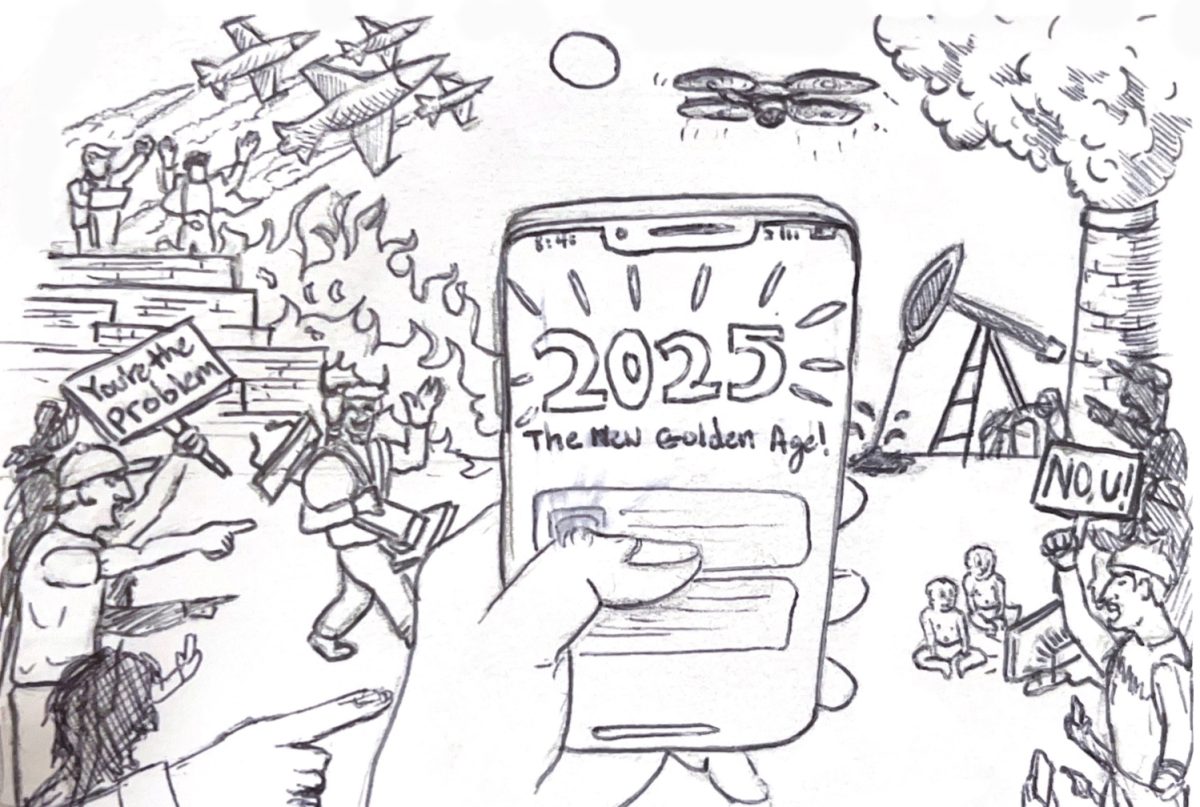On the eve of Y2K, the world teetered between fear and hope.
Some predicted catastrophe — collapsing computer systems, financial ruin and global panic — while others envisioned the dawn of a technologically advanced millennium.
The world did not end, but the future we inherited was not the one many had imagined.
Instead of a Golden Age of boundless human potential, we have entered something else: a second Gilded Age.
Technological advancements are obscuring deep social fractures, economic inequality is widening, corporate influence over government is growing unchecked and the climate crisis is escalating.
We view the 21st century as a time of progress, but history may call it an era of regression masked by technological innovation.
I got my first cell phone at 12 years old, an age by which 71% of American kids have a phone, according to a 2021 study by Common Sense Media.
We believed these devices would connect us, and they do — perhaps too well. Virtual relationships have replaced real-world bonds, leaving us with fewer close friendships, declining social engagement and a loneliness epidemic.
Social media’s link to rising anxiety, depression and sleep deprivation among Gen Z youth will likely define our era.
And it’s not just us.
Gen Alpha’s childhoods are increasingly shaped more by algorithmic content than by exploration and human connection.
They will never know about when “the internet used to be a place,” as one viral meme put it. When you walked away from the computer, you walked away from the internet.
What was once open and chaotic is now sanitized, commercialized, and algorithmically curated.
With unskippable ads, paywalls and corporate surveillance, the internet has become a hyper-monetized, data-mined economy where engagement is biometrically optimized for profit.
Artificial intelligence and its architects are accelerating this transformation, threatening to reshape society at a dizzying pace, often with little oversight or concern for the long-term climate consequences.
Tech billionaires like Elon Musk and Peter Thiel, once libertarian dreamers, now wield their power to influence governments and amass untold wealth. Musk, for instance, is using his Department of Government Efficiency appointment to deregulate industries, cut social programs and increase corporate control over government functions.
President Biden’s final message warned about the state of democracy and the development of not just an oligarchy in the United States, but specifically a tech-industrial complex.
History repeats — down to the billionaire robber barons promoting Nazi ideology — but even Henry Ford never did a Roman salute in public.
Since 2016, civil rights have regressed while “awareness” has never been higher, from increasing racialized violence and the erosion of abortion access, to the disturbing rise in transphobic legislation.
Our generation was supposed to move forward, yet we are backsliding on nearly every front.
As with the first Gilded Age, economic and environmental crises are intertwining. The fossil fuel lobby, emboldened since the Bush era, ensures that “drill, baby, drill” remains law, locking us into a future of escalating climate disasters.
Future generations ravaged by the climate crisis will surely have a lot to say about crypto and the sitting President of the United States releasing his $TRUMP memecoin the day of his inauguration, subsequently increasing his net worth by the tens of billions, according to a Jan. 20 Yahoo Finance article.
President Trump also recently pumped $500 billion into the Stargate Project, which seeks to invest in American AI companies, according to a Jan. 21 USAToday article.
This investment was foiled a few days later with the release of Chinese AI-model DeepSeek receding the U.S. economy overnight.
Nvidia Corporation recorded the largest single-day loss of any company on Wall Street at $600 billion.
We have clear examples of the fragility of our social and economic systems, even the fabric of human relationships is at risk when left at the mercy of unchecked technological development.
Some say empires only last 250 years. By that math, the U.S. is running out of time. Whether or not that’s true, the signs of decline are clear: climate catastrophe, wealth hoarding and a government beholden to the ultra-rich.
Despite all this, not everything is bleak. Scientific advancements, grassroots movements and resilient communities persist. The question is whether they will be enough to counterbalance everything working against them.
We stand at a crossroads: one path leads to equitable prosperity and a balance between technology and humanity. The other leads further into techno-oligarchy and whatever follows this second Gilded Age.
Shaped by social media, algorithmic control and economic instability, we are the first generations raised in a world on the brink of climate destruction. Because we were the first, we must ensure we are the last.
Gen Z and Gen Alpha are not just inheriting this world, we are learning how to change it. The same tools that surveil and divide us can be wielded to organize and resist.
The first Gilded Age didn’t last forever. Neither will this one.













